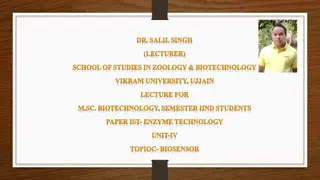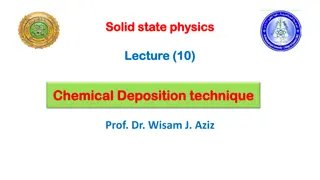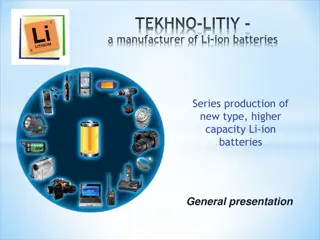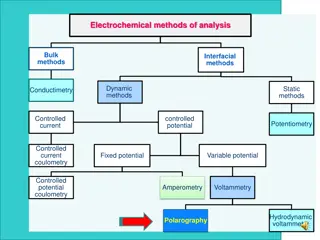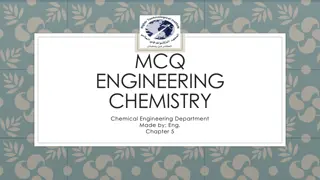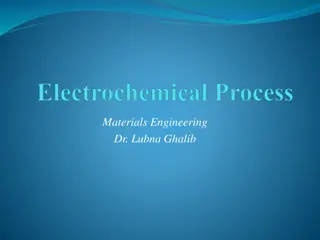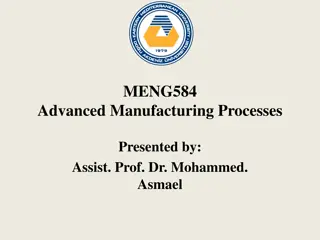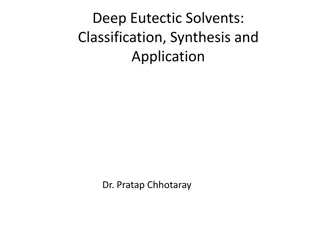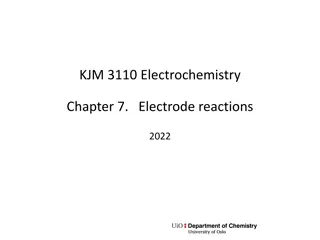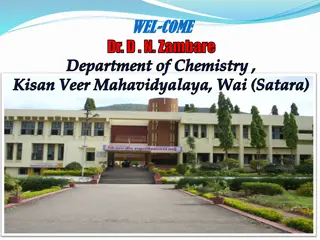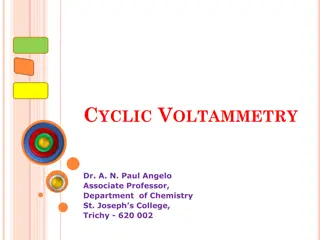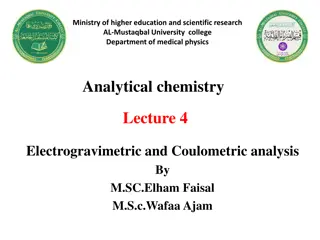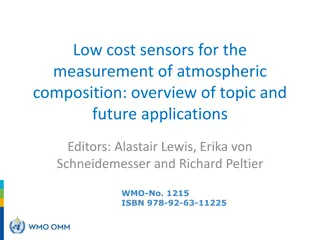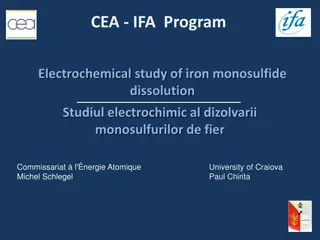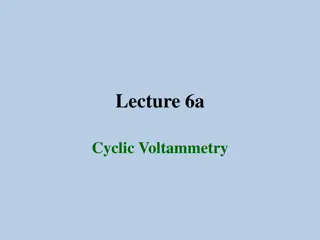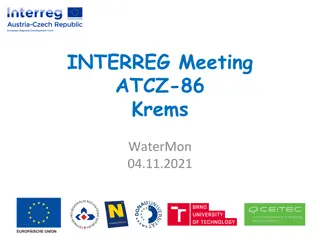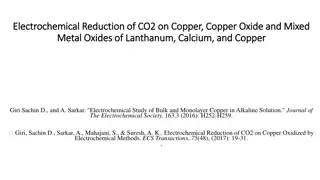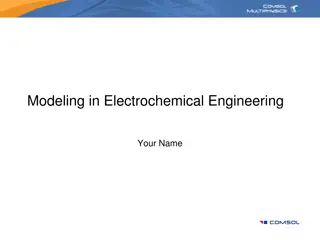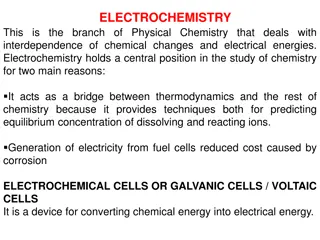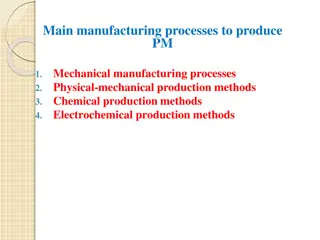Overview of Biosensors: Applications and Types
Biosensors are advanced analytical devices that convert biological responses into quantifiable signals, comprising bioreceptors and transducers. They play a crucial role in various fields, meeting specific requirements for accuracy, reproducibility, and ease of use. Different types of biosensors suc
9 views • 8 slides
Understanding Resting Membrane Potential and Excitability in Cells
Explore the concepts of resting membrane potential (RMP), excitability in cells, and the electrochemical basis behind them. Learn about the characteristics of excitable and non-excitable tissues, the factors influencing RMP, and the role of ion distribution in generating the negative charge inside c
0 views • 15 slides
Evolution of Mathematical Theories and Proof Systems
Development of mathematical theories such as model theory, proof theory, set theory, recursion theory, and computational complexity is discussed, starting from historical perspectives with Dedekind and Peano to Godel's theorems, recursion theory's golden age in the 1930s, and advancements in proof t
1 views • 29 slides
Chemical Deposition Techniques in Solid State Physics
Chemical deposition is a fabrication technique using different chemicals for reactions, allowing coatings to form successfully. Techniques include spray pyrolysis, electrochemical deposition, dip coating, and more. Spray pyrolysis, cost-effective and versatile, is used in various commercial processe
1 views • 25 slides
Psychological Theories of Criminality: Understanding the Roots
Psychological theories of criminality delve into the association between intelligence, personality, learning, and criminal behavior. Major theories include Psychodynamic Theory by Freud, Behavioral Theory by Bandura, and Cognitive Theory by Kohlberg. These theories explore how unconscious mental pro
1 views • 20 slides
Advancements in Li-ion Battery Technology by Tekhno-Litiy
Tekhno-Litiy, a prominent manufacturer of Li-ion batteries, introduces higher capacity batteries with exceptional advantages such as high energy density, no memory effect, low self-discharging, and fast charging. They excel in the production of second-generation Li-ion batteries based on nano-struct
0 views • 5 slides
Understanding Polarography in Electrochemical Analysis
Explore the realm of polarography, a type of voltammetry utilizing the dropping mercury electrode (DME) and mercury pool. Learn about classical polarographs, the Ilkovic equation, advantages and disadvantages of mercury drop electrodes, and how to minimize polarographic maxima in electrochemical ana
1 views • 23 slides
Gas Detector Alarms Market Future Prospects 2030
Global Gas Detector Alarms Market Breakdown by Type (Electrochemical sensors, Catalytic sensors, Infrared sensors, Photoionization sensors, Others) by Modality (Portable, Fixed) by End-Use Industry (Oil & Gas, Chemical & Petrochemical, Metal & Mining
1 views • 8 slides
Understanding the Theory of Firms: Neoclassical vs. Modern Approaches
The theory of firms is explored through the Neoclassical and Modern perspectives. Neoclassical theory focuses on profit maximization, while Modern theory delves into managerial, principal-agent, and transaction cost theories. The discussion covers criticisms of Neoclassical theory and the essential
1 views • 79 slides
Corrosion Prevention Methods in Chemical Engineering
Define oxidation, reduction, oxidizing agent, reducing agent, standard electrode potential, Nernst equation, and corrosion in the context of chemical engineering. Discuss different forms of corrosion, including uniform corrosion, galvanic corrosion, pitting corrosion, and stress corrosion. Explore m
0 views • 20 slides
Understanding Electrochemical Processes in Materials Engineering
Electrochemical processes play a crucial role in materials engineering, specifically in the context of corrosion. These processes involve both oxidation (anodic reaction) and reduction (cathodic reaction) reactions occurring simultaneously. Maintaining a balance between these reactions is essential
3 views • 22 slides
Theories of Causation in Psychological and Social Sciences
Overview of theories of causation categorized into psychological, social psychological, and sociological perspectives. Psychological theories focus on instinctive, biological, and psychological qualities of abusers, including Attachment Theory, Psychodynamic Theory, Social Learning Theory, and Situa
0 views • 15 slides
Understanding Political Theory through a Contextual Approach
Exploring G.H. Sabine's perspective on political theory through a contextual approach, emphasizing the importance of historical context and societal influences. Sabine argues that while political theory evolves with its contemporary politics, it should be analyzed within its specific time and social
0 views • 9 slides
Advanced Hybrid Electrochemical Machining Processes
Hybrid electrochemical machining processes combine chemical dissolution and electrochemical dissolution mechanisms with mechanical or thermal assistance to achieve high material removal rates and improved surface quality. Techniques such as laser-assisted chemical etching and ultrasonic-assisted mac
1 views • 26 slides
Deep Eutectic Solvents: Classification, Synthesis, and Applications
Deep Eutectic Solvents (DES) are versatile solvents formed by mixing specific acids and bases. These solvents exhibit unique hydrogen bonding properties, resulting in a lower melting point compared to individual components. DES can be classified into hydrophobic and hydrophilic types, each with dist
3 views • 7 slides
Evolution of Light Theory: From Wave Theory to Quantum Theory
At the turn of the century, the discovery of the photoelectric effect challenged the wave theory of light, leading to the development of the quantum theory by Max Planck and Albert Einstein. This new theory introduced the concept of discrete energy units known as quanta, bridging the gap between wav
1 views • 62 slides
Understanding Electrode Reactions in Electrochemistry
Exploring electrode reactions in electrochemistry involves delving into Faraday's law, coulometry, and the importance of sustainable electrode reactions. These concepts help us understand how the quantity of charge passed affects the production or consumption of substances in electrode reactions. As
4 views • 27 slides
Understanding Potentiometry and Electrochemical Cells
Electrochemical cells play a vital role in redox reactions, with potentiometry being a quantitative analysis method based on measuring potentials. These cells consist of two half-cells where reduction and oxidation take place, forming anode and cathode. Reference electrodes like calomel and Ag/AgCl
0 views • 9 slides
Understanding Corrosion and Electroplating in Chemistry
Delve into the fascinating world of corrosion and electroplating with a detailed exploration of their principles, processes, and methods of protection. Learn about atmospheric corrosion, immersed corrosion, chemical corrosion, underwater corrosion, and underground corrosion. Discover the electrochem
2 views • 36 slides
Dp-branes, NS5-branes, U-duality, and M-Theory Overview
Overview of Dp-branes, NS5-branes, and U-duality derived from nonabelian (2,0) theory with Lie 3-algebra. Introduction to M-theory, including M2-branes and M5-branes in the strong coupling limit. Discussion on BLG theory, Lorentzian Lie 3-algebra, and the ABJM theory for M2-branes.
1 views • 32 slides
Understanding Cyclic Voltammetry in Electrochemical Analysis
Cyclic voltammetry is a crucial electroanalytical technique for studying electrochemical behavior. It involves sweeping potential in a cyclic manner to measure current responses, aiding in understanding redox processes, electron transfer kinetics, and coupled reactions. The technique requires carefu
0 views • 10 slides
Understanding Time-Independent Perturbation Theory in Quantum Mechanics
Perturbation theory is a powerful tool in solving complex physical and mathematical problems approximately by adjusting solutions from a related problem with known solutions. This theory allows for more accurate approximate solutions by treating the difference as a small perturbation. An example inv
0 views • 19 slides
Ethical Theories: Divine Command vs. Virtue Theory Explained
Divine Command Theory asserts that morality is derived from God's commands, contrasting with Virtue Theory which focuses on developing moral virtues to achieve human flourishing and excellence. Divine Command Theory relies on religious texts, while Virtue Theory emphasizes the cultivation of virtues
0 views • 24 slides
Understanding Electrogravimetry for Analytical Chemistry Applications
Electrogravimetry is a technique utilized for the precise separation and quantification of metal ions in a substance. By depositing analytes on electrodes through electrochemical reduction, this method enables accurate determination of metal concentrations in solutions. It finds applications in quan
0 views • 21 slides
Overview of Low-Cost Sensors for Atmospheric Composition Measurement
This publication provides an insightful overview of low-cost sensors for measuring atmospheric composition, covering topics like sensor technologies, applications in atmospheric sciences and air quality management, and evaluation methods. It emphasizes the importance of not only the technical perfor
0 views • 17 slides
Understanding Fermi Liquid Theory in Interacting Fermion Systems
Fermi liquid theory, also known as Landau-Fermi liquid theory, is a theoretical model that describes the normal state of metals at low temperatures. Introduced by Landau and further developed by Abrikosov and Khalatnikov, this theory explains the similarities and differences between interacting ferm
0 views • 23 slides
Understanding Electrochemical Double Layer Theory
Electrochemical double layer theory explains the distribution of charges and ions at the interface between an electrode and an electrolyte solution. It involves concepts like space charge density, Nernst-Planck equations, and Gouy-Chapman theory to describe the behavior of ions and electric fields i
0 views • 15 slides
Study on Electrochemical Dissolution of Iron Monosulfide in Nuclear Waste Disposal
Exploration of the electrochemical dissolution of iron monosulfide in the context of nuclear waste disposal, focusing on its impact on redox potential, corrosion products, and transport of radionuclides. The project aims to clarify reaction kinetics, mechanisms of sulfur release, and factors control
0 views • 13 slides
Computational Learning Theory: An Overview
Computational Learning Theory explores inductive learning algorithms that generate hypotheses from training sets, emphasizing the uncertainty of generalization. The theory introduces probabilities to measure correctness and certainty, addressing challenges in learning hidden concepts. Through exampl
0 views • 43 slides
Automata Theory and Theory of Computation Overview
This course overview covers concepts in automata theory and theory of computation, including formal language classes, grammars, recognizers, theorems in automata theory, decidability, and intractability of computational problems. The Chomsky hierarchy, interplay between computing components, modern-
0 views • 42 slides
Theories of Interest in Microeconomics II
Explore various theories of interest in economics, including the Classical Theory, Liquidity Preference Theory by Keynes, Productivity Theory, Abstinence Theory, Time-Preference Theory, Fisher's Time Preference Theory, and the Loanable Fund Theory. These theories offer different perspectives on the
0 views • 6 slides
Understanding Cyclic Voltammetry in Electrochemical Methods
Electrochemical methods, such as cyclic voltammetry, are crucial for studying electron transfer processes, redox reactions, and adsorption on surfaces. Cyclic voltammetry involves varying the applied potential at a working electrode to monitor electron flow and chemical reactions. Peaks in the curre
0 views • 11 slides
Electrochemical Sensing Module Overview and Potentiostat Parameters
In this meeting, the Electrochemical Sensing Module based on the EmStat-pico potentiostat was discussed. The module features precise, low-power control unit Arduino MKR Zero and supports techniques such as voltammetry and EIS. Potentiostat parameters include a full dc-potential range, EIS frequency
0 views • 16 slides
Exploring the Evolution of Atomic Theory
Delve into the historical journey of atomic theory starting from Democritus and Aristotle's views to modern advancements proving some aspects of Dalton's theory incorrect. Learn about key laws and theories such as the Particle Theory of Matter, Dalton's Atomic Theory, and JJ Thomson's discoveries, s
0 views • 30 slides
Electrochemical Reduction of CO2 on Copper and Mixed Metal Oxides
Different methods for CO2 reduction have been studied, with electrochemical reduction showing promise due to its use of electricity from nonconventional sources. Research on copper's unique characteristics for producing various CO2 reduction products has led to investigations into optimizing activit
0 views • 30 slides
Challenges and Impacts of Active Metals in Electrochemical Technologies
Safety concerns arise from the reactivity of active metals like lithium, leading to fire and explosion risks. Economic challenges include high costs and limited availability of these metals. Environmental aspects highlight pollution risks from improper disposal. Images and descriptions illustrate th
0 views • 7 slides
Understanding Electrochemical Systems and Processes
Electrochemical engineering involves the study of devices and processes that convert chemical energy to electrical energy through ionic conductors. This field explores redox reactions, energy-producing processes, electrocatalysis, anodic and cathodic reactions, and the interplay between thermochemic
0 views • 25 slides
Understanding Electrochemistry: The Interplay of Chemical Changes and Electrical Energies
Electrochemistry, a branch of Physical Chemistry, explores the relationship between chemical reactions and electrical energies. It serves as a vital link between thermodynamics and other areas of chemistry, offering insights into equilibrium concentrations and facilitating the generation of electric
0 views • 24 slides
Macromechanical Analysis of Lamina and Tsai-Hill Failure Theory Overview
The Tsai-Hill failure theory is based on the strengths of a unidirectional lamina, incorporating longitudinal and transverse tensile and compressive strengths, as well as in-plane shear strength. This theory, derived from the distortion energy theory, provides criteria for determining lamina failure
0 views • 15 slides
Main Manufacturing Processes to Produce PM - Mechanical, Chemical, Electrochemical
The process of producing PM involves various manufacturing processes such as mechanical grinding and milling, physical-mechanical production methods, chemical production methods, and electrochemical production methods. Mechanical processes include grinding and milling using jaw crushers, hammer grin
0 views • 12 slides
